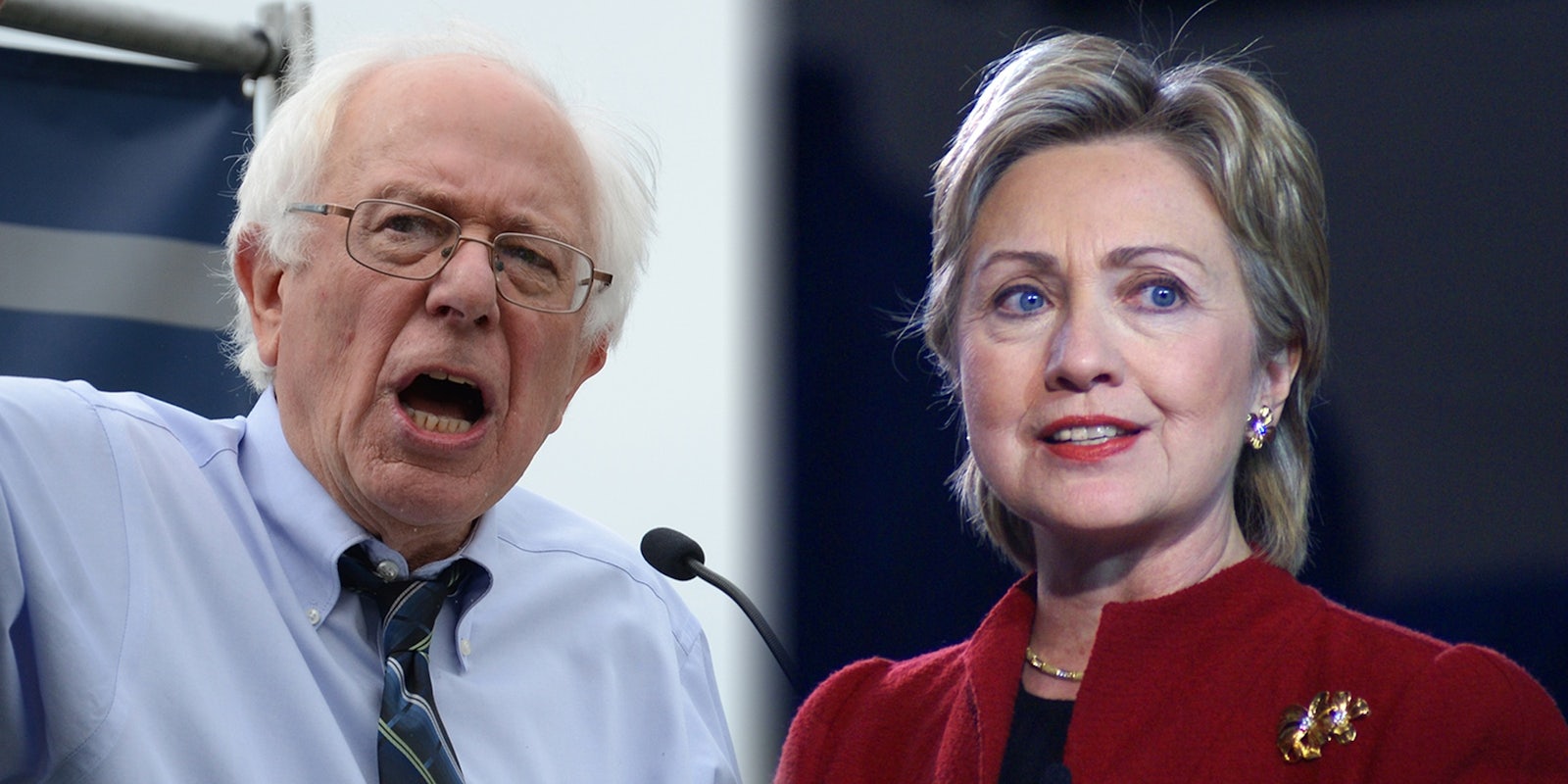Less than one percentage point separates Bernie Sanders and Hillary Clinton in the 2016 Democratic presidential primary in Kentucky.
With 99 percent of precincts reporting, Clinton held a 0.04-point lead over Sanders—a difference of just over 1,900 votes out of more than 454,500.
The two candidates repeatedly flipped positions as the night wore on, thought it appears that Clinton will come out on top—though the delegate divide will remain roughly even.
Regardless, the Clinton camp is declaring victory.
We just won Kentucky! Thanks to everyone who turned out. We’re always stronger united. https://t.co/8qYPHIje8I pic.twitter.com/elNUP4nFoO
— Hillary Clinton (@HillaryClinton) May 18, 2016
There are 55 delegates up for grabs in Kentucky, 37 of which are awarded at the district level based on vote percentages in each district. Another 12 are awarded based on the state-wide vote, and the remaining six are party officials. Once all the votes are counted, Clinton and Sanders will each walk way with roughly half of the state’s delegates.
Clinton was predicted to have a slight edge going into Tuesday night’s vote. Polling in the state has been sparse, but a survey taken in March gave the former secretary of state a five-point lead. A model based on demographic patterns compiled by FiveThirtyEight’s Nate Silver presaged Clinton beating Sanders by two points.
In most election cycles, Kentucky’s Democratic primary doesn’t attract much attention because it comes so deep into the primary season. This year is different.
Unlike in recent contests, which Clinton effectively ceded to Sanders by expending relatively few resources in states the Vermont senator was slated to easily carry, Clinton has expended a significant effort in the Bluegrass State. Not only did she beat her 2008 Democratic presidential primary rival Barack Obama there, but her husband became the first Democratic presidential nominee to carry the state in a generation when he beat George H. W. Bush in 1992. As part of her effort to carry the state, CNN reports, Clinton held 11 campaign events in Kentucky over the past three weeks.
Even so, Clinton faced an uphill battle in Kentucky. Last week, she was bested by Sanders in nearby West Virginia by an 18-point margin. However, Kentucky has a significantly larger African-American population, which as largely backed Clinton throughout the primaries.
While Clinton still maintains a practically insurmountable lead in pledged delegates over Sanders, the race remains contentious. Going into Tuesday’s slate of elections, which also includes a primary vote in Oregon, Clinton had 2,240 delegates to Sanders’s 1,473, with 2,383 required to clinch the nomination.
The ultimate outcome in Kentucky may not result in a major change in the math, but it is significant in the big picture. “There are not that many contests between now and the convention,” former Kentucky Rep. Mike Ward, who is now a political consultant in the state, told the Louisville Courier-Journal. “And if [Clinton] goes into the convention having lost a whole bunch of them that just makes things a little tougher. … The presumptive nominee—and it has been that way forever and ever and ever—runs the convention, decides the speaking order, who speaks, the messages for each day.”
“And if Sen. Sanders keeps winning it’s going to make it tougher for the [Democratic National Committee] to let Hillary’s people run the show,” Ward continued. “And it’s really important for the eventual nominee to run the show.”
On the Republican side, where Donald Trump has already locked up the nomination, there is no primary vote in Kentucky. Instead of a primary this cycle, the state held a caucus in March following an effort by Kentucky Sen. Rand Paul.
Paul was running for president, but state rules prevented him from simultaneously being on the Kentucky primary ballot for president and for his reelection to the Senate. Paul spent over $250,000 on a campaign to push the state to switch from a primary to a caucus to solve his problem; however, by the time the caucus occurred in early March, he had already dropped out of the presidential race.
Update 10:06pm CT, May 17: Kentucky Secretary of State Alison Lundergan told CNN that she expects Clinton to be the “unofficial winner” of the Kentucky Democratic primary.
“I do believe … that based on what we are seeing coming in, that Kentucky will remain in a win column for the Clintons,” Grimes told Wolf Blitzer. “Hillary Clinton will be the unofficial winner.”
The Clinton campaign took the opportunity to declare itself a win.
We just won Kentucky! Thanks to everyone who turned out. We’re always stronger united. https://t.co/8qYPHIje8I pic.twitter.com/elNUP4nFoO
— Hillary Clinton (@HillaryClinton) May 18, 2016
Grimes was one of the principle opponents to Paul’s efforts to appear on the Kentucky ballot under both president and senator.
